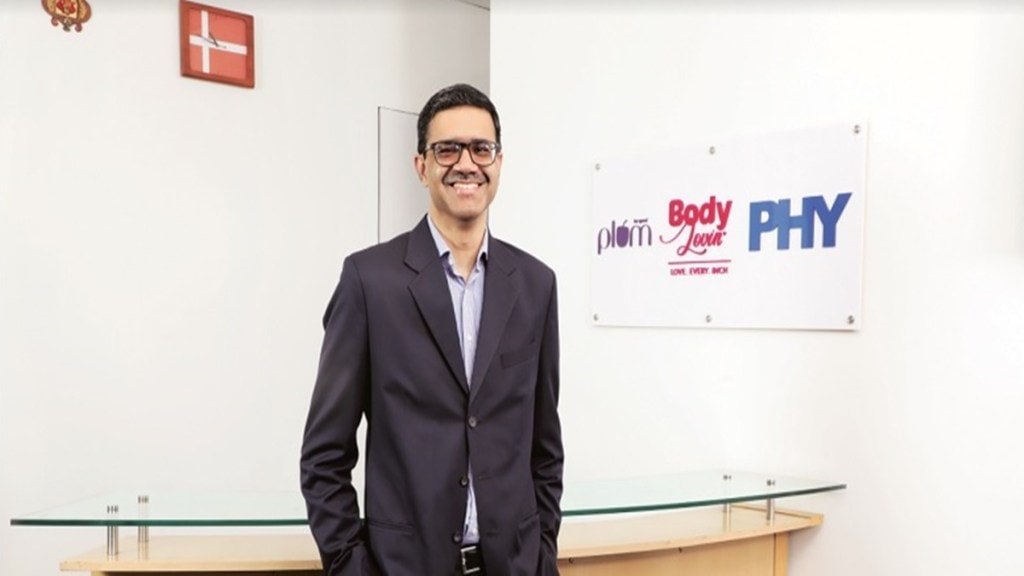DIRECT-TO-CONSUMER (D2C) beauty brand Plum recently raised `270 crore in fresh capital, helping its holding company Pureplay Skin Sciences reach a valuation of around `1,900 crore. CEO and founder Shankar Prasad speaks with Akanksha Nagar on how the nine-year-old firm, which owns the brands Plum, BodyLovin’ and Phy, will use the funding to grow its omnichannel presence and accelerate expansion in categories beyond skincare. Excerpts:
How do you intend to use the fresh influx of funds into Plum?
To begin with, we are investing in product R&D, formulation, production and packaging, all of which will be accelerated as part of the backend technology. Second, it is marketing where the capital is going to be deployed, in delivering good quality products. Third, we are investing in category growth. While Plum is associated with skincare products, BodyLovin’ has bath and body products, and Phy is for men, we have also been working on developing other categories—mainly hair care and makeup.
Within hair care, we are present in the oil, wash and conditioning segments. There’s a lot more depth as well as width possible here, for instance, problem-solution products such as masks and scrubs, as well as more cosmetic-oriented solutions like serums and mousses. In makeup, we are looking at both the traditional as well as newly emerging trends in eye, lip, face, and nails fashion.
To what extent did the third wave of Covid-19 impact your business? What is your revenue target for FY23?
D2C skincare brands have grown amidst the pandemic since the demand has been healthy. We have an omnichannel presence. Retail certainly did get hit with the supply chain getting disrupted and we have had our fair share of supply chain challenges, too. However, the bounce back in the retail market has been good. In terms of revenue, we are currently at two-and-a-half times where we were in Q4, last year.
Our revenue is approximately `20 crore per month now, and we plan to touch `45-50 crore on a monthly basis by next March. What is really going to unlock that growth is retail expansion, better brand building and new products that are lined up.
Currently, 60% of our revenue comes from online channels and 40% from offline. Within online, close to about a quarter of sales comes from our own D2C channel and the rest 70-75% comes in from online marketplaces.
How do you plan to expand your retail footprint in FY23?
The number of assisted retail outlets is set to go up from the current 1,000 to roughly 2,000 this fiscal, whereas the number of unassisted retail outlets will increase by around five times from the current 10,000. Also, we intend to expand the number of exclusive retail stores from three to 50. In terms of footfall, our exclusive brand outlets (EBOs) are running above breakeven. We are also working on opening experiential stores soon.
Globally, we have been seeing good traction in the US, Kenya, Mauritius, Philippines and Nepal. We aim to get at least 10% of our revenue from international locations this fiscal.
How is your marketing strategy different for smaller cities?
Within D2C sales, 35% of it comes from the top eight to 10 cities, and the rest from non-metros. To tap opportunities in these regions, not only have we partnered with shopping channels such as Flipkart, but also in terms of marketing, we have doubled our activity in the vernacular space. Our retail distribution footprint has been steadily building up in these areas. We also have smaller unit packs and samplers which helps us build traction in smaller cities, as these help people familiarise themselves with the brand.
How much does each of your brands contribute to overall revenue?
Phy’s contribution is small to the business overall, but we want to make the brand accessible and relatable to even more men. This will be done through all elements of the marketing mix, this year.
BodyLovin’s contribution is in the 15-20% range, which will continue to grow. Within Plum, which is obviously our biggest brand, there is a need for us to consolidate—and in some cases—even renew our portfolio in skincare. Hence, there will be more innovation and upgrades within the skincare category.

